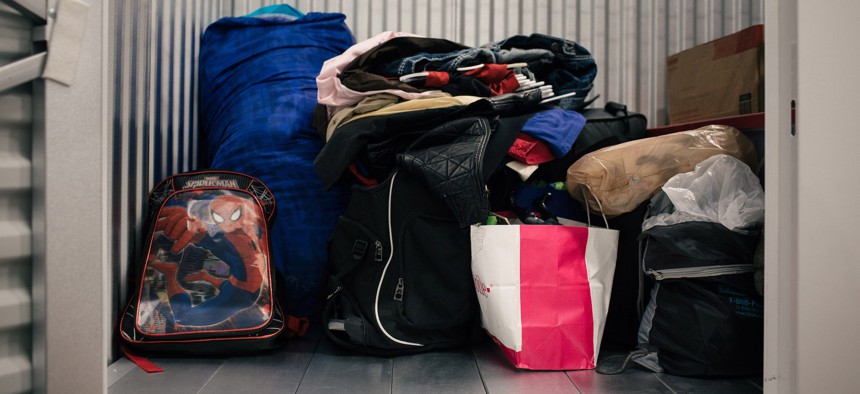Prevention pays off: How one city may soon end family homelessness

A Milwaukee family's belongings in a storage unit after being evicted in 2018. Alyssa Schukar for The Washington Post via Getty Images

Connecting state and local government leaders
Milwaukee’s community leaders and social services organizations are setting common goals and directing resources toward keeping families from becoming homeless in the first place.
In a testament to the power of prevention, Milwaukee could soon be the first community to end family homelessness.
No families have lived on the city’s streets since 2020, according to the federal U.S. Interagency Council on Homelessness, or USICH. Between 2021 and 2022, the amount of time families spent in Milwaukee shelters or transitional housing declined 72%.
People experiencing unsheltered homelessness often have to navigate a variety of services and organizations before finally accessing the help they need. But in Milwaukee, the focus has been on directing resources toward efforts that prevent families from becoming homeless and has proven extremely effective, according to Krystina Kohler, financial stability portfolio manager for the United Way of Greater Milwaukee & Waukesha County.
Prior to 2020, there were only two preventive programs available to Milwaukee-area families at risk of experiencing homelessness. Today, there are more than 20, Kohler said. The programs provide legal services, financial assistance, and a housing resource center for tenants and landlords.
They are part of an initiative facilitated by the United Way of Greater Milwaukee & Waukesha County and the city-led homeless services consortium, the Milwaukee Continuum of Care.. In 2020, the groups launched the Safe and Stable Homes: Ending Family Homelessness Initiative, which brought together leaders and researchers in education, criminal justice, health care and homelessness services to gather ideas about approaches to reduce family homelessness. But the group ultimately decided to take on a bigger goal: end family homelessness altogether.
“When the pandemic hit, [there was] this community shift in perspective,’” Kohler said. The thinking was, “‘Of course, we should be preventing homelessness.’ So many of us are so close to experiencing housing insecurity—it takes one unexpected event to lose what you thought was a really stable thing.”
Using USICH criteria and benchmarks for ending family homelessness, the initiative utilizes a “collective impact model,” which brings different organizations together toward a common goal rather than leaving each to its own agenda and strategies, Kohler said. For Milwaukee, that has meant settling on one definition of family homelessness for all agencies and sectors to work with. It has meant sharing data and creating one dashboard to track progress. And it has meant constant communication, bringing all partners together to meet quarterly to strengthen relationships between shelters, rapid rehousing providers and eviction lawyers.
The initiative relies on the annual Point in Time count orchestrated by the U.S. Department of Housing and Urban Development to track unsheltered homelessness. Over the last decade, there was an average of four families living unsheltered on Milwaukee streets during the count, Kohler said. In between point-in-time counts, the initiative relies on data collected on homeless families by the effort’s partners.
A major force behind the reduction in family homelessness is the Family Flex Fund, a pot of money that families can use when they don’t qualify for other assistance or when there aren’t enough rapid rehousing vouchers to go around.
But the Flex Fund does more than pay rent. Families can also use it to cover energy and utilities. The money can even be used for vehicle repairs to ensure family members can get to work, Kohler said. The program has been funded at $1 million in part by pandemic relief funds and fundraising for each of the last three years.
Over the last two years, the Flex Fund program served more than 200 families at risk or experiencing homelessness. Of those, only one family returned to homelessness. By keeping families out of shelters, or giving them the assistance to quickly leave shelters, more beds are available, reducing overall counts of unsheltered homelessness.
Preventive measures don’t always come in the shape of direct cash assistance, Kohler noted. Last year, the Safe and Stable Homes initiative supported 800 landlord-tenant mediations, which allow stakeholders to talk through problems instead of jumping to eviction.
“Landlords don't want to file for eviction—it’s not fun for anyone,” she said.
Milwaukee serves as an example of just how powerful interagency collaboration and preventive thinking can be, said USICH Executive Director Jeff Olivet, who recently visited Wisconsin for a housing conference.
“I'm incredibly excited about the work going on in Milwaukee,” he told Route Fifty. “I sat down with the family homelessness team from Milwaukee and was just really struck by how thoughtful their approach is, how sustained it has been. It’s a real partnership.”
Olivet said other cities, like Washington, D.C., have seen a significant decline in family homelessness in recent years. But it's important to note that those reductions came with help from pandemic relief programs, like the child tax credit and eviction moratorium. “Unless we're able to continue those, there's some danger that things start going in the wrong direction,” Olivet said.
Part of Milwaukee’s success can be attributed to pandemic relief funds, Kohler acknowledged, and it will take a robust fundraising effort to ensure all those preventive programs remain funded at the level they have been. But Safe and Stable Homes can show that preventive programs are well worth the investments.
The landlord-tenant mediations program, for example, has served more than 5,000 households since its launch, which has freed up about $9 million in reduced crisis response spending.
“It's cost savings for the community,” Kohler said. “It’s good for the shelter staff, it’s good for the families, it's good for the kids, good for the schools, good for the court system—just good for everybody.”

NEXT STORY: As ranked choice voting gains momentum, parties in power push back



